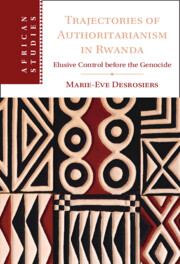Book contents
- Trajectories of Authoritarianism in Rwanda
- African Studies Series
- Trajectories of Authoritarianism in Rwanda
- Copyright page
- Dedication
- Contents
- Figure
- Tables
- Abbreviations
- Trajectories of Authoritarianism
- 1 The Study of Authoritarianism
- 2 Should Rwanda Matter to the Study of Authoritarianism?
- 3 Some Background
- 4 The Shape of Authoritarianism in Pre-genocide Rwanda
- 5 Communicating Norms for Behavior
- 6 Challenges to the Monopoly of Legitimate Violence
- 7 Competition around and within the Security Sanctum
- 8 The Political and Economic Grind
- 9 Local and Individual Trajectories
- Conclusion
- Bibliography
- Index
- African Studies Series
Conclusion
Published online by Cambridge University Press: 19 January 2023
- Trajectories of Authoritarianism in Rwanda
- African Studies Series
- Trajectories of Authoritarianism in Rwanda
- Copyright page
- Dedication
- Contents
- Figure
- Tables
- Abbreviations
- Trajectories of Authoritarianism
- 1 The Study of Authoritarianism
- 2 Should Rwanda Matter to the Study of Authoritarianism?
- 3 Some Background
- 4 The Shape of Authoritarianism in Pre-genocide Rwanda
- 5 Communicating Norms for Behavior
- 6 Challenges to the Monopoly of Legitimate Violence
- 7 Competition around and within the Security Sanctum
- 8 The Political and Economic Grind
- 9 Local and Individual Trajectories
- Conclusion
- Bibliography
- Index
- African Studies Series
Summary
The Conclusion turns to the lessons and takes a look at authoritarian trajectories in Rwanda and beyond suggests. It stresses how a focus on moments that we believe make or break authoritarianism draws us away from the making and decaying implicit in more ordinary moments of authoritarianism. It shows how this has been a specific gap of our studies of Rwanda prior to the genocide. Rediscovering some of the sources of instability over the course of the two republics would, indeed, have allowed us to make better sense of some of politics and choices surrounding the genocide.
- Type
- Chapter
- Information
- Trajectories of Authoritarianism in RwandaElusive Control before the Genocide, pp. 340 - 363Publisher: Cambridge University PressPrint publication year: 2023

